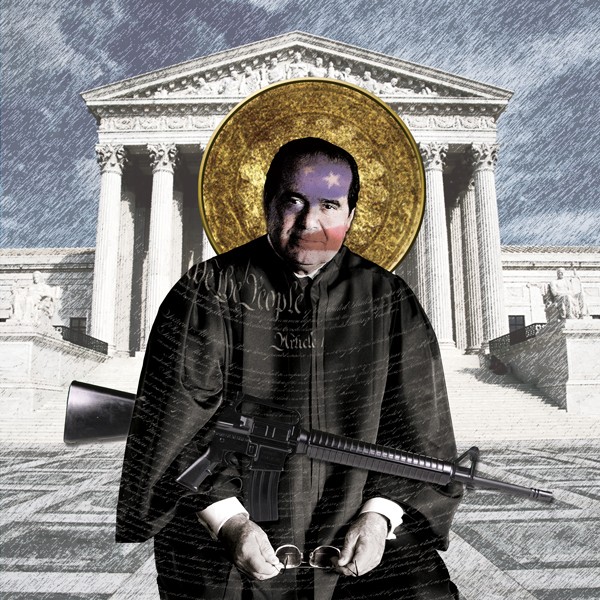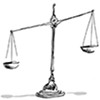Over Valentine's Day weekend, Antonin Scalia, who had served on the Supreme Court for 29 years, died while on a hunting vacation in Texas. The spiritual leader of the neoconservative movement, Scalia was taking a little romantic getaway and died sometime overnight or in the morning.
From my review of the astrology, I don't think he was murdered, and I do think it's possible that he had company and died in the saddle, like other great men before him. He was traveling with a companion, not his wife.
Scalia had served on the court since September 1986. That is one full cycle of Saturn, beginning when Saturn was in Sagittarius to its return to that position. There could be no better astrology to describe Scalia's patriarchal, fundamentalist religion-based view of the law than this. That he lasted one full Saturn orbit is striking; it really says that a long cycle is complete.
Scalia was appointed by Ronnie Reagan in the days before we knew about the Iran-Contra scandal. At the time, Scalia was a relatively new federal district court judge, and was nominated to the Supreme Court to replace William Rehnquist, whom Reagan had elevated to chief justice. Scalia was so influential, and around for so long, it seemed like he had been there forever, and would be there forever.
Writing in the Forward in 2009, J.J. Goldberg described Scalia as "the intellectual anchor of the court's conservative majority." If you've been listening to television news, you've been hearing him revered not just as the charismatic, affable guy that he was, but also as a titan of American jurisprudence. Scalia gave the neoconservative movement the illusion of legitimacy.
He wrote the decision in Bush v. Gore that stopped the Florida recount in the contested 2000 election. He gave the election to Bush, who had lost the popular vote, and, true to his legal style, included a line about how the decision does not set legal precedent. That, of course, is one of the Supreme Court's most important roles, but Scalia dissed it when it suited his ends.
Scalia was considered the divining oracle of what he called "originalism," meaning that the Constitution's meaning is fixed at the time of enactment, and that's what we must consider. He touted the idea that you have to follow the original text, not what the courts had interpreted over the next few centuries. What he really meant was that he got to be original in his interpretations of the Constitution, stretching them to mean anything he wanted. There are many examples of his votes, which always fit with what we now think of as the conservative agenda: anti-gay, anti-abortion, anti-minority, pro-gun, pro-wealthy, pro-religion (if Christian), and pro-death penalty.
If you've ever wondered how this particular set of issues came to be grouped together as what we think of as "conservative," you don't need to look much further than Scalia as the primary arbiter of reality. He was to the judicial system what Rush Limbaugh is to the conservative voter base. It makes no sense to be "pro life" and "Christian" and also support the death penalty.
Contemporary conservatism is a kind of postmodern pastiche of ideas that one must be versed in deconstructionist philosophy to grasp even vaguely. If you're Republican and you disagree even with one of them, you're a potential liberal and considered ineligible to hold public office. But this really took some conjuring, and nonstop brainwashing.
It makes more sense if you take it context of what political operative Karl Rove said in 2004 to the New York Times Magazine: "We're an empire now, and when we act, we create our own reality. And while you're studying that reality—judiciously, as you will—we'll act again, creating other new realities, which you can study too, and that's how things will sort out. We're history's actors and you, all of you, will be left to just study what we do."
Due to Scalia's exit, we're about to see a turning of the tide in American politics. It will manifest first as outwardly expressed conflict. Now, for the first time in a generation, the Supreme Court is split evenly between conservative and liberal justices. Many of the most important decisions of our lifetimes have been decided on five-to-four votes, and for the moment this means of ruling the country with a majority of justices on the court is over. And if a Democrat is elected in November, it will be over for a long time.
If Scalia's main role was to turn back the clock to some imagined era of purity, moral wholesomeness, and American greatness, the hands of judicial time are now frozen in the present moment. The court has a busy calendar this term, with decisions on abortion, contraception, union rights, affirmative action, and immigration on the docket. The court will be deadlocked on these cases.
This could not have come at a worse time for Republicans, who are already in chaos (Donald Trump has taken advantage of that fact). There's a reason that Mitch McConnell, the Senate majority leader, said that any Obama nominee was DOA, and that the new president should fill the vacancy. He spoke up even before Scalia's body had been removed from the hotel room where he died. McConnell knows that nobody like Scalia will get the job. By that I mean such a masterful, magical conjurer of illusions.
Constitutional originalists are always the first people to ignore the document itself; it's abundantly clear that the president nominates Supreme Court justices and the Senate votes to approve them. There is no exception stated for presidents who still have a year to serve. I think Obama will be clever and send over a nominee whom this Senate has already approved for a lower court posting, making it more difficult for them to block the person.
Whatever happens with Obama's nominee(s), Supreme Court appointments now become a central issue in the presidential election. Typically, appointments to the court are not among the reasons people vote for a candidate. This is now front and center, where it belongs. There are several elderly judges; the next president may get to make three or more appointments, who may serve for decades. Supreme Court justices, who are appointed for life, are the single most important legacy of any president.
Remember that Scalia was part of Reagan's legacy, set in motion by voters in the 1980 election, who were swayed by the Iranian hostage crisis. Though nobody knew this at the time, the Reagan campaign essentially bribed the evil, radical Iranian militants to keep the hostages in captivity just a little longer. He did this by promising them all the weapons they wanted for their war against our then-friend Saddam Hussein of Iraq (while campaigning on a "no arms for hostages" platform). Carter looked ineffective, and Reagan and Bush "won" the 1980 election, from which Scalia was a hangover.
My observation is that what we call modern conservatism is really a form of illusionism. First of all, they never get into office legitimately. Let's do a brief recap of recent Republican history. Nixon won in 1968 with a "secret plan" to end the Vietnam war. That turned out to be bombing Cambodia and Laos, extending the war five more years.
Nixon won in 1972 due to the activities of CREEP (the Committee to Re-Elect the President) aka the Watergate criminal enterprise. He resigned just before Republicans had him step out onto the gallows of an impeachment trial in the Senate. Many in his administration were convicted of crimes. Nixon was succeeded by Gerald Ford, who was only an elected congressman. His real credential was having served on the Warren Commission, which whitewashed the then-recent murder of John F. Kennedy.
When Republicans came to power in 1980, they gained their advantage thanks to the shams associated with the Iranian hostage crisis. They then diverted the profits from weapons sales to the Iranians to the Contras in Nicaragua; that whole program became known as the Iran-Contra scandal. Reagan and Bush held the White House for 12 years, till early 1993.
When next Republicans came to power, it was the result of the divided Bush/Gore election of 2000. Gore got more actual votes by real-life citizens, though thanks to the Supreme Court majority led by Scalia, the recount was stopped and Bush and Cheney got to take office. I'm not sure how anyone can keep a straight face while calling this democracy.
We get to live with the legacies of these people for decades. This includes someone who could write this and be taken seriously:
"Many Americans do not want persons who openly engage in homosexual conduct as partners in their business, as scoutmasters for their children, as teachers in their children's schools, or as boarders in their home. They view this as protecting themselves and their families from a lifestyle that they believe to be immoral and destructive. The Court views it as 'discrimination' which it is the function of our judgments to deter. So imbued is the Court with the law profession's anti-anti-homosexual culture, that it is seemingly unaware that the attitudes of that culture are not obviously 'mainstream.'"
What Scalia was saying is that the majority has the right to decide what the minority does—but that's not the purpose of the Constitution. The majority view of any society does not need to be protected. It already has the power. The American system of law is, on its face, anyway, specifically designed to protect those with unpopular views; that's what free speech means: the freedom to say things people disagree with.
On one level we might describe Scalia as a majoritarian. He believed that the majority should have rights over the minority. The problem was that his own views were not really mainstream, any more than the Moral Majority was a majority. They just claimed to be one.
Among Scalia's triumphs of "originalism" was his decision in the landmark 2008 case, District of Columbia v. Heller. This led to our current problem with guns, and consecrated the viewpoint that the Second Amendment guarantees an absolute right to carry a handgun.
Scalia claimed that you can find out all you need to know from the original text, but he had to write 64 pages to say what 27 words meant. The Second Amendment reads, "A well regulated militia being necessary to the security of a free State, the right of the People to keep and bear arms shall not be infringed."
"Logic demands that there be a link between the stated purpose and the command," he wrote in his decision. So we know he knows logic exists. then he threw out logic by saying that the first part of the sentence (a well regulated militia) was merely prefatory, and the real substance was in the second part (bearing arms). He "proves" this by elaborating at length on the definitions of "keep," "bear," "arms," and the phrase "bear arms." He might as well have found that the Constitution protects the right to arm bears.
In a dissent from a famous decision on abortion, he wrote, "I am sure it does not," meaning that the Constitution does not protect that right. Why not? "Because of two simple facts: (1) the Constitution says absolutely nothing about it, and (2) the longstanding traditions of American society have permitted it to be legally proscribed."
The Constitution also doesn't mention breathing, eating, or flying kites. And "longstanding traditions of American society" goes exactly contrary to the idea of "original intent." It's as close to pure hypocrisy as you can get.
When I imagine a real conservative, it's someone who practices restraint, who leaves their neighbors alone, who follows the law, and who respects the idea that everyone gets to pursue their own happiness, as long as they don't hurt others. It's someone who conserves the power of government to maintain a stable society, which means using the power of regulation to protect the people, the environment, and the interests of the nation.
I don't think that's what we got, but it's certainly what we need.



























